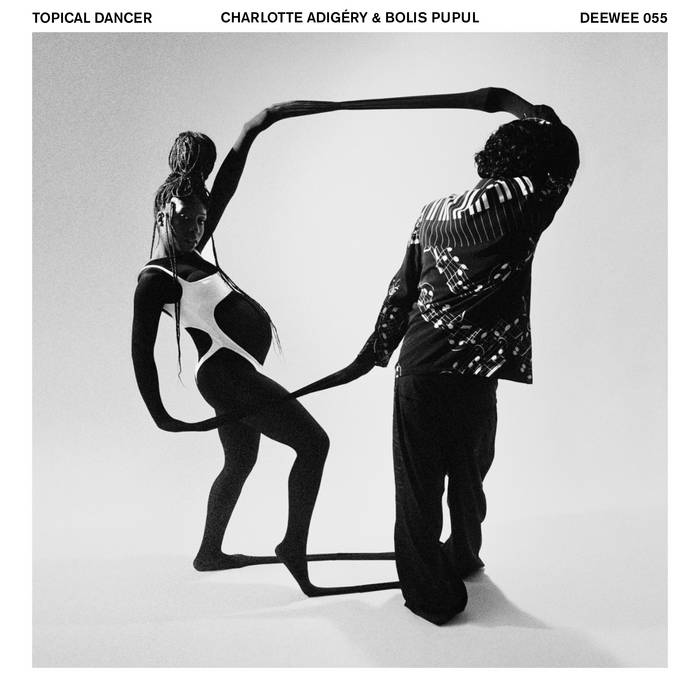Charlotte Adigéry & Bolis Pupul – Tropical Dancer
Belgian-Caribbean musician Charlotte Adigéry has often been referred to as the future of dance music. This isn’t an unfounded observation; there’s certainly no one quite like her active in the sphere of electronic and left-field pop right now. Central to Adigéry’s artistry, and part of her progressive allure, is her provocative handling of identity politics. She finds inspiration in her inherent creolisation, pulling from the iconography of Black icons in the lieu of Josephine Baker, Grace Jones, and Prince in the formulation of her own image. Together with her musical partner Bolis Pupul, Adigéry uses Eurocentric electropop as a vehicle towards current rhetoric, formulating her image as commentary on issues of identity politics, colonialism, and misogyny. This counterclash has been a sort of reclaiming for her, rewriting the Eurocentric exotification of the Black body on her own terms. The title of her and Pupul’s debut album, Tropical Dancer, alludes to this subversion. Released on Soulwax’s DEEWEE label, the record is a transgressive body of work that turns party into politics and discourse into dance by way of eclectic and kaleidoscopic electronica and dance pop that’s remarkable both in its sonic and theoretical scope.
Tropical Dancer functions as both cultural commentary and straight up fantastic dance music, with Adigéry & Pupul’s lyrics taking on issues such as xenophobia, racism, and colonial misogyny while their production (with help from Soulwax) turns these manifestos into deliciously good formulations of house, techno, and R&B. For both artists, the conceptual framework of their collaboration is distinctly personal. Both are of mixed immigrant descent, with Adigéry of French, Martinican, and Guadeloupean descent and Pupul of Chinese and Belgian descent. The experience of being both part of an ethnic diaspora and European inform what they explore in their music. On Blenda, Adigéry contemplates the dichotomy of her split heritage as exacerbated by xenophobia. “I look like them, but not to them / I sound like you, but not to you” she muses, attempting to reconcile the European perception of Blackness with her lived reality. “What is them (I am here) / Who are you (’cause you were there’)” she continues against a slick, bass-inflected funk groove that weaves Afro-Caribbean textures with pulsing techno and French touch. The heady conundrums on Tropical Dancer avoid didacticism by way of Adigéry and Pupul’s wicked sense of humour. “Go back to your country where you belong,” opens the refrain of Blenda, followed quickly by the witty response of “Siri, can you tell me where I belong?”
Download and stream Tropical Dancer here
Their humour is integral to the record, and the barrage of inside jokes and general mischievousness pushes Tropical Dancer into ever expanding surrealism, often highlighting the absurdity of their subject matter. HAHA is a standout that leans most into this bizarreness, using it to create an experience that both draws in and alienates the listener. Using the concept of an inside joke as a metaphor for the experience of being othered, the track takes Adigéry’s devilish laugh and chops it into a bouncy refrain against modular bass, making for something addictive and propulsive, pulling you in closer until you’re shut out with a flippant “guess you had to be there.” It’s genius music making. Soulwax’s influence is palpable on tracks like HAHA, but most prominent on It Hit Me. Like a stranger version of Heaven Scent, Adigéry recounts a monologue about being catcalled while Pupul tells the story of their sexual awakening against metallic industrial techno and wolf whistles. These wry dance moments are balanced by some softer and more slow-burning R&B moments. Reappropriate deals with ideas of appropriation, not just cultural but the appropriation of gender signifiers and the reclamation thereof. The soulful Hey is Tropical Dancer’s answer to a power ballad, and a statement of the duo’s intersectional identity. But even in these quieter moments, Adigéry and Pupul’s sly humour remains. The sumptuous Huile Smisse (apparently, the phonetic spelling of how Will Smith is pronounced in a French accent) pokes fun at French speaking people who are seemingly obsessed with the sound of their own voices, playing on tropes of loungey French music. Album closer Thank You is a send off in both senses of the term, an irreverent jab at anyone who’s given the duo unsolicited advice sung in that familiar sing-song tone of performed gratitude that we’ve all had to put on at some point.
Tropical Dancer is a remarkable debut LP, one which pushes the boundaries of Adigéry and Pupul’s electroclash, avant-pop influences by playing within them but on their own terms. It’s a refreshing take on a sound that is otherwise attributed to gratuitous hedonism, Eurocentric glamour, and notions of an elite underground. Surreal, irreverent, and painstakingly real, with Tropical Dancer Adigéry and Pupul imagine a new kind of dancefloor for the age of PC culture and post-colonial identity. The future of dance music, perhaps, but only because they are so in tune with the present moment.
Listen to HAHA from Tropical Dancer below.
Follow Charlotte Adigéry & Bolis Pupul



